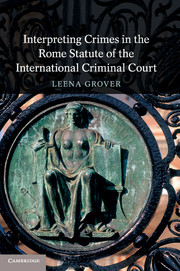Book contents
- Frontmatter
- Dedication
- Contents
- Foreword
- Acknowledgements
- 1 Introduction
- 2 The state of the art
- 3 Guiding interpretive principle
- 4 Challenges to the principle of legality
- 5 Operationalizing the principle of legality
- 6 Custom as an aid to interpretation
- 7 Internal indicia of codification
- 8 External indicia of codification
- 9 The Vienna Convention (1969) and aids to interpretation
- 10 Conclusions
- Bibliography
- Index
- References
3 - Guiding interpretive principle
Published online by Cambridge University Press: 05 November 2014
- Frontmatter
- Dedication
- Contents
- Foreword
- Acknowledgements
- 1 Introduction
- 2 The state of the art
- 3 Guiding interpretive principle
- 4 Challenges to the principle of legality
- 5 Operationalizing the principle of legality
- 6 Custom as an aid to interpretation
- 7 Internal indicia of codification
- 8 External indicia of codification
- 9 The Vienna Convention (1969) and aids to interpretation
- 10 Conclusions
- Bibliography
- Index
- References
Summary
Introduction
In Chapter 2, a representative sample of the ICTY’s and ICTR’s jurisprudence was canvassed in order to glean insights on developing a method of interpretation. One of the findings of that study is that no widely accepted and recognized primary principle has emerged to guide judges in their interpretive reasoning. Accordingly, the next three Chapters are dedicated to identifying a guiding interpretive principle for crimes in the Rome Statute, articulating that principle’s content in a manner that could be useful to judges and lawyers and cataloguing arguments that are (in)consistent with it.
To appreciate the interpretive imperatives set out in the Rome Statute, this Chapter begins by recalling the normative tensions underlying international criminal law. Next, the interpretive imperatives in articles 21(3) and 22 of the Rome Statute – interpretation consistent with international human rights and interpretation consistent with the principle of legality – will be examined. It will be argued that the guiding interpretive principle for crimes in the Rome Statute is legality. An attempt will therefore be made to reconcile article 21(3) with this reading and to give it content that is consistent with legality.
- Type
- Chapter
- Information
- Publisher: Cambridge University PressPrint publication year: 2014



